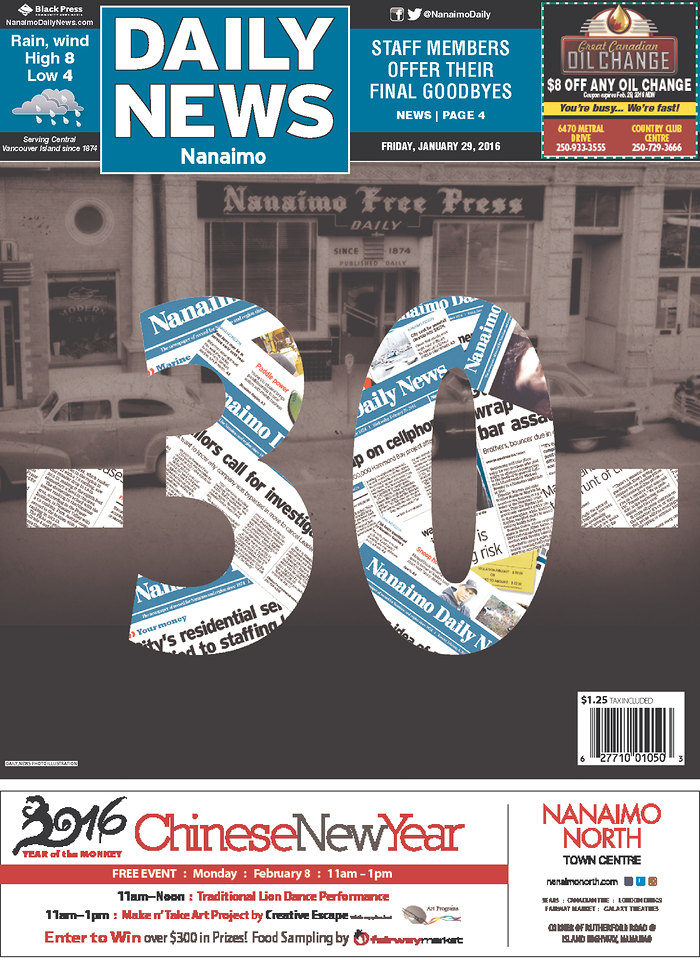Paul Walton graduated from the Ryerson School of Journalism in 1991. He began at the Nanaimo Daily Free Press in 1993, which became the Nanaimo Daily News in 1997. He has been the night editor at the Daily News since 2012.
Print journalists watch as the last flickering embers of what was a tremendous blaze that warmed an entire civilization begin to go out.
By Paul Walton for the Nanaimo Daily News
Democracy is one of those words easily spoken and casually used, but more difficult to understand and explain.
The ongoing task of clarifying that concept of democracy has belonged to the daily newspaper.
The work of journalists and editors has been to translate democracy from a sometimes vague concept into a reality that we can all understand, act on and use. It is job so important and so challenging that it must be renewed every day.
When I started at the Daily Free Press in 1993, that process was in full swing. We covered areas where your awareness, understanding and input were vital; at city hall, the courts, school board and health to name a few. We scrutinized areas where those in authority would be held to account in the event that authority was abused.
In the last week various columns have been written and comments made, initially following cuts and changes at Postmedia newspapers, about the importance of a free press in upholding democracy.
Marsha Lederman in the Globe and Mail articulated the issue better than I can. Stephanie Coombs, ex of the Times Colonist and let go from the Edmonton Journal, has made similar insightful comments.
That such thoughts must now be articulated widely and out loud indicates to me a grave situation in the “Fourth Estate”—the press as distinguished from broadcast and now digital media.
Print journalists watch as the last flickering embers of what was a tremendous blaze that warmed an entire civilization begin to go out.
The principle behind the Fourth Estate is that words have meaning and potentially tremendous impact. Beginning in the late 18th century the first newspapers closed a loophole by which the first two traditional estates, the church and the aristocracy, kept the third estate — you and me — from having our say in the exercise of power.
For the last two centuries daily newspapers (in countries where the right to freedom of speech has existed) questioned, probed and generally acted as a gadfly to “afflict the comforted and comfort the afflicted,” as the reporters’ credo goes. More than any other institution in Western democracies, newspapers have exposed injustices and been a force for greater equality.
But the work of newspapers was never exclusively to attack those to whom we give authority to make and enforce our laws and collect and administer our taxes.
Some misguided souls believe that the role of the press is to be not a watchdog but an attack dog. A responsible press also looks for solutions and supports actions that are in the interest of an entire community, actions that are right, moral and good and uphold community standards.
At times we have been our own worst enemy. At one end is the phone hacking scandal in the United Kingdom, at the other are efforts to use newspapers as a means to promote ideology and political bias.
Ideologues on both the right and left have been guilty of this abuse. Using newsgathering as a pretext to peddle ideology of one sort or the other has done more to bring the press into disrepute than any phone hacking scandal could.
Journalists can never be objective—that’s just not possible—but they are called on to be fair, accurate and balanced.
And I have faith that my remaining scribe colleagues—“ink-stained wretches of the Fourth Estate” is intended as a compliment—will continue to adhere to the truth that “if it’s not fair, accurate and balanced, then it’s not a news story.”
But upholding those principles also requires resources, and with advertisers now reaching more eyes on social media at no cost, and readers getting news for free on the Internet, the cash is no longer there.
Profit and quality journalism must go hand in hand.
The ship of state now sails on with a broken rudder and the helmsman over the side.
“O nimium coelo et pelago confise sereno, nudus in ignota, Palinure, jacebis arena.”
— Virgil
This piece originally appeared in the Nanaimo Daily News, and is republished here with the author’s permission.

